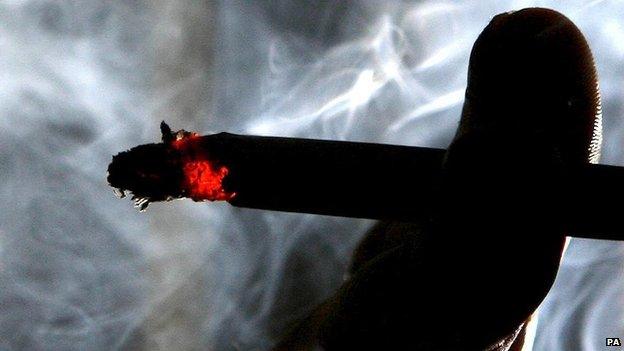Smoking ban in prisons: Inmate wants access to enforcement hotline
- Published

The Health Act 2006 bans smoking in enclosed public places
A prisoner has launched a legal challenge to give inmates the right to report unauthorised smoking in jail.
Paul Black, an inmate at HMP Wymott in Lancashire since 2009, suffers from health problems aggravated by passive smoking.
He wants a judicial review of a policy which denies prisoners access to an NHS phone line designed to help enforce smoking bans in enclosed public places.
A judge at the High Court in London said he would soon make his decision.
The NHS compliance line allows members of the public to seek enforcement of the 2006 Health Act, which limits where people can smoke in England.
'Grass line'
Justice Secretary Chris Grayling has previously backed the prison governor's decision not to allow inmates general access to the free phoneline.
Lawyers representing Mr Grayling have argued that Crown Immunity, which extends to all bodies acting as agents of the Crown, external - including Her Majesty's Prisons - prevents the Health Act applying to state prisons.
They maintained prison rules, such as the withdrawal of privileges for inmates, are sufficient to deal with unauthorised smoking.
Mr Black accused the justice secretary of breaching his own rules, as well as human rights laws.
Shaheen Rahman, representing him, told the court it was not until he had launched judicial review proceedings that HMP Wymott agreed to give him personal access to the compliance line.
Black argued that left him vulnerable to being singled out and targeted, and it fell short of his request that all prisoners should have access.
Ms Rahman said staff could also be among those reported for unauthorised smoking, and the prison officer who had told Black he was getting access to the line had referred to it as "the grass line".
'Confidential access'
It was accepted by all sides that about 80% of prisoners smoke, she said.
Ms Rahman added it was Mr Black's case, corroborated by three other prisoners, that prison staff "appeared to turn a blind eye" and failed to enforce the smoking ban outside designated rooms.
Mr Black had complained of being frequently exposed to second-hand smoke in areas where smoking was prohibited, especially on landings, in laundry rooms and in healthcare waiting rooms.
Asking the court to dismiss the case, Jonathan Hall QC argued that refusing general access to the confidentiality line did not conflict with prison rules or violate the European Convention on Human Rights.
Prisoners were already allowed confidential access to certain lines, including the Samaritans, but there was a risk that allowing more access could lead to possible abuse, he said.
"The line has to be drawn somewhere in the interests of security and good order," Mr Hall added.
- Published11 February 2015

- Published12 February 2015
